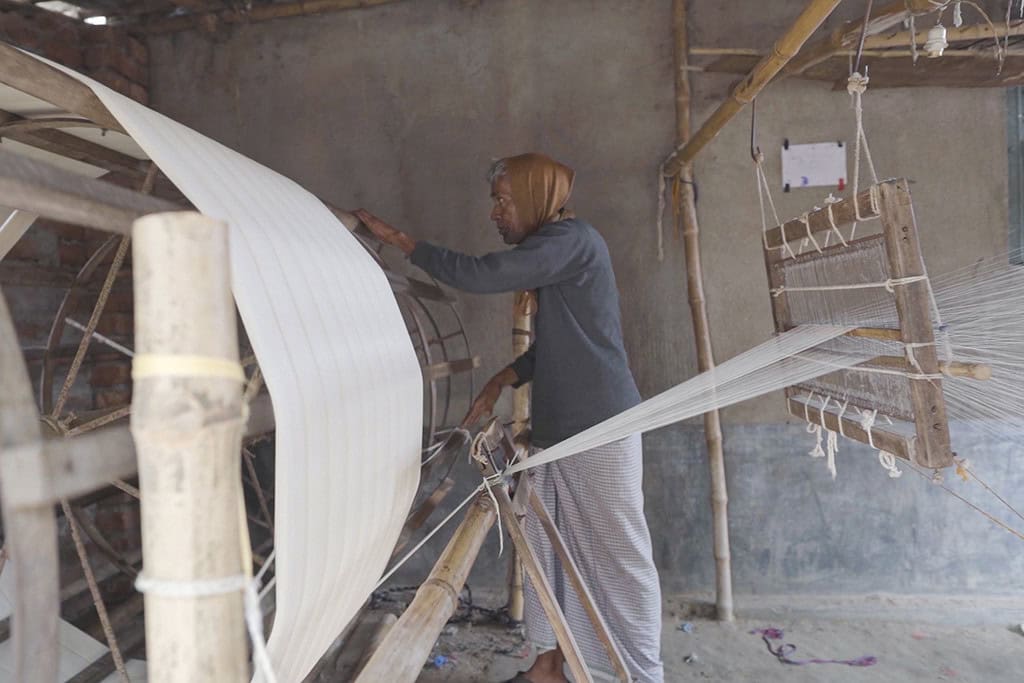Anuprerna creates equitable green jobs for underserved artisans in India
Under the Green Growth Initiative, Acumen has invested in a company that brings sustainable, handloom fabrics to the global market by empowering rural artisans.
- Blog
- Dignified jobs
- India

For centuries, rural artisans in India have created some of the most vibrant and coveted handmade fabrics in the world. The rise of Fast Fashion and mass-produced textiles, however, has imperiled their profession. They now operate in an unorganized market on an irregular and self-employed basis. They lack access to credit facilities, social security, or government schemes and are often dependent on middlemen who exploit them for raw material and credit.
Anuprerna, an Acumen accelerator investee, is building a more equitable and sustainable business model. Rather than ask artisans to buy raw material for wholesale production, which requires large capital allocations, Anuprerna buys raw materials itself and processes them in an organic and eco-friendly fashion. Next, it connects with fashion brands and designers through its e-commerce platform, allowing them to select and order fabrics for sampling and purchase. Finally, it partners with rural artisans to execute custom-tailored, wholesale production on their handlooms — with reduced dependence on middlemen or predatory credit schemes.
Since launching in 2019, Anuprerna has built a customer base that includes an international array of brands and designers and has partnered with approximately 300 rural artisans in West Bengal cumulatively. The artisans have experienced more consistent work and are estimated to have increased their income by around 30 percent. In a recent impact study completed by 60 Decibels, one in three weavers reported a significant increase in their income after engaging with Anuprerna.
“Rural artisans are an important part of India’s culture and workforce,” says Amit Singha, founder and CEO of Anuprerna. “This is about more than protecting traditions that have been passed down for generations. Anuprerna is proving that artisans deserve to get paid fairly in safe conditions while contributing to a sustainable future for fashion.”
Centering rural workers
Singha grew up in a small village in West Bengal and remembers seeing artisans running their looms as a young boy. It was part profession, part family and national tradition. Parents taught children. Master artisans apprenticed the next generation. As Singha grew older, fewer artisans could make enough money to support themselves and their families. With growing industrialization and liberalization, the artisans had to compete with much cheaper textile imports and inadequate knowledge of the markets.
Singha’s desire to support and empower rural artisans and promote and preserve East India’s traditional crafts led him to found Anuprerna. The company’s mission is also environmental. It uses azo-free and natural dyes. It only works with certified organic partners for raw materials, which include cotton, khadi, linen, and indigenous silks like Tussar, Mulberry, Ketya, and Eri. Handloom production uses few resources and requires no electricity. The resulting products deliver the level of consistency, quality, and sustainability that eco-friendly and high-end fashion brands and designers demand.
In its early days, Anuprerna was an off-line B2B enterprise that targeted large brands and retailers in India. When the Pandemic hit, it migrated online with an e-commerce platform and found traction with small- and medium-sized fashion designers and brands around the world. These new customers were digitally savvy and eager to embrace the sustainable and artisanal ethos of the Anuprerna brand.
Anuprerna now operates a direct-to-consumer digital platform on one side and a business-to-artisan platform on the other. Anuprerna communicates with master artisans project by project and asks for a reasonable timeline and fair price. It then sends materials from its processing facility through the mail. Naturally, it’s a slower process than mass-produced textiles coming out of garment factories, but it’s more sustainable, of higher quality, and unique — the whole point of the Slow Fashion revolution.
Why we Invested
At Acumen, we believe that the emergence of climate positive business models can create dignified jobs in previously unorganized sectors. We are excited about Anuprerna’s commitment to bring consistent and higher income to artisans living in poverty in rural areas and has the potential to unlock more equitable value chains in the move to climate positive textile production.
There are an estimated 6.8 million rural artisans in India. Anuprerna’s current network, by comparison, is a drop in the bucket. At the same time, the company is primed to scale. With Acumen’s investment, it hopes to reach 1000 artisans in the next three years. Furthermore, we believe that its success will pave the way for other textile companies and more investors to get behind decentralized models of production.
“We believe that solutions for India’s informal economy and climate change can lie in social enterprises whose business models generate equitable green jobs,” says Acumen RM, Nidhisha Philip. “Given Amit’s lived experience having worked with artisans in Burdhwan, we are excited to support his development of a business that is committed to building sustainable work for artisans in West Bengal.”